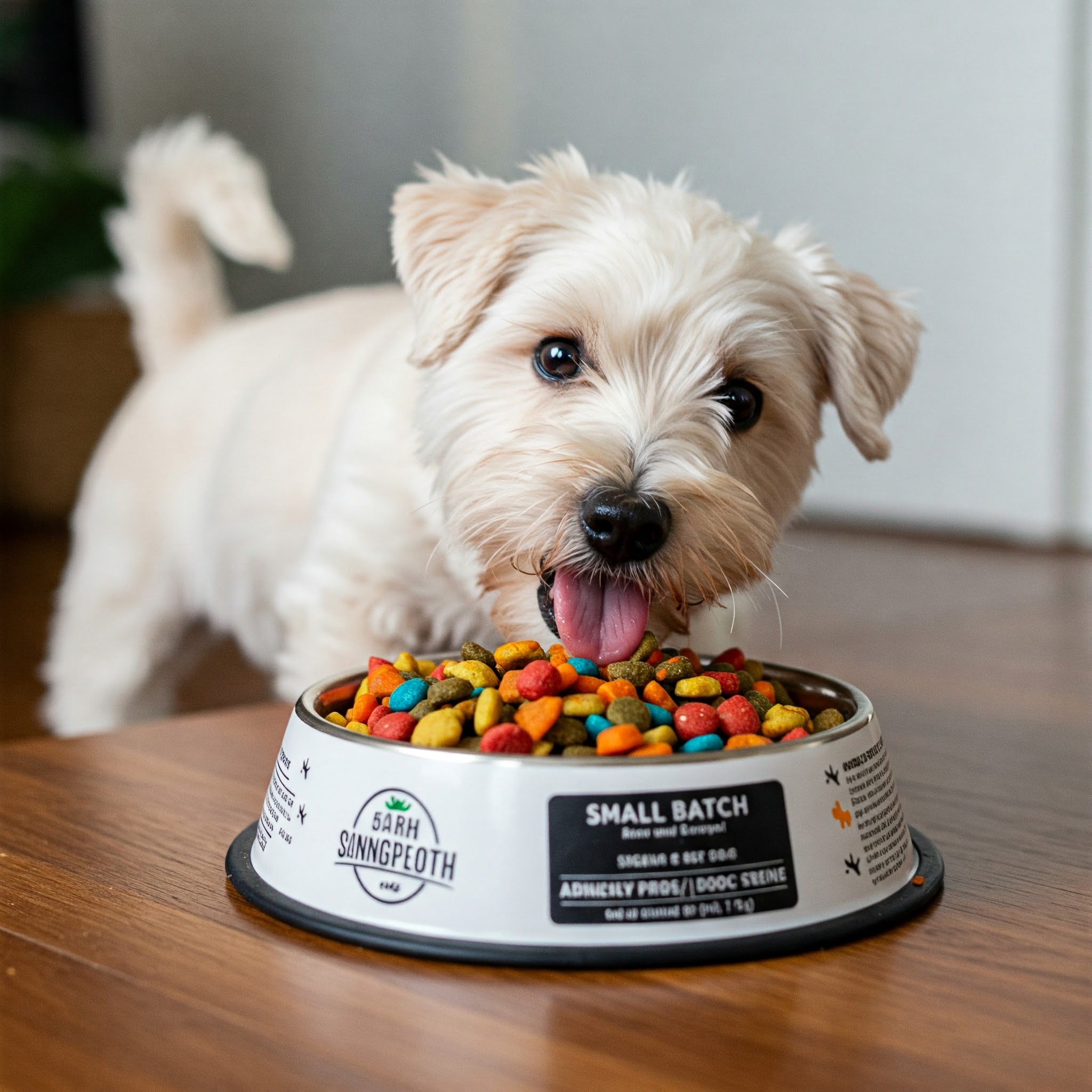The Rise of Premium Pet Nutrition
🐾 As a devoted dog parent, you likely spend countless hours researching the best nutrition options for your furry companion. The pet food landscape has transformed dramatically in recent years, with more owners seeking high-quality alternatives to mass-produced kibble. Among these premium options, small batch dog food has emerged as a standout choice for pet parents who prioritize quality, freshness, and nutritional excellence.
Small batch dog food represents a return to thoughtful, careful food production – where quality supersedes quantity, and nutrition takes precedence over extended shelf life. Unlike conventional pet food manufacturing that produces tons of kibble in single production runs, small batch processing creates limited quantities with greater attention to detail and ingredient quality.
As someone who has researched pet nutrition extensively and consulted with veterinary nutritionists, I can confidently say that the small batch approach offers distinct advantages worth considering for your canine companion. Let’s explore why this feeding method is gaining popularity among discerning pet parents and how it might benefit your four-legged family member.

What Exactly Is Small Batch Dog Food? ⚡
Small batch dog food refers to pet food produced in limited quantities rather than mass-manufactured. This production method prioritizes quality control, ingredient freshness, and nutritional integrity. Think of it as the difference between a meal prepared by a personal chef versus fast food – both provide calories, but the quality, attention to detail, and nutritional composition differ significantly.
✅ Key characteristics of authentic small batch dog food include:
- Production in limited quantities to ensure freshness
- Stricter quality control and ingredient inspection
- Higher-quality, often human-grade ingredients
- Greater attention to nutritional balance
- Typically made with fewer preservatives
- Often produced by smaller, specialized companies
- Frequently includes regional or seasonal ingredients
- Usually offers better traceability of ingredient sources
The small batch philosophy centers around the belief that dogs deserve food made with the same care and quality standards as human food. Many small batch manufacturers apply human food safety standards to their pet food production, going beyond the minimum requirements set by regulatory bodies like AAFCO (Association of American Feed Control Officials).
7 Remarkable Benefits of Small Batch Dog Food 🔋
1. Superior Ingredient Quality
Small batch dog food companies typically prioritize ingredient quality over cost savings. Rather than using the cheapest available proteins and fillers, these manufacturers often source premium ingredients like free-range chicken, grass-fed beef, and wild-caught fish. Additionally, many small batch foods incorporate fresh vegetables and nutritious superfoods like blueberries, spinach, and sweet potatoes.
The focus on quality extends to avoiding problematic ingredients commonly found in mass-produced foods. Many small batch options exclude:
- Artificial preservatives (like BHA, BHT, and ethoxyquin)
- Artificial colors and flavors
- Low-quality meat by-products
- Excessive fillers like corn, wheat, and soy
- Anonymous meat meals (where the specific animal source isn’t identified)
For example, instead of listing “meat meal” as an ingredient, a small batch formula might specify “deboned chicken” or “grass-fed lamb,” providing transparency about what’s actually in your dog’s food.
2. Enhanced Nutritional Value 🌱
When ingredients are fresher and minimally processed, they retain more of their natural nutritional value. Small batch dog food often contains higher levels of:
- Bioavailable proteins (easier for dogs to digest and utilize)
- Natural antioxidants from fresh fruits and vegetables
- Essential fatty acids in their intact form (rather than synthetic additives)
- Naturally occurring vitamins and minerals
The nutritional density of small batch food means your dog may need to eat less volume to get the same nutritional benefit, potentially making these foods more economical than they initially appear. Additionally, nutrients in their natural form are often more bioavailable than synthetic alternatives added after cooking.
3. Stricter Quality Control Procedures ✅
With smaller production runs comes enhanced ability to monitor quality. Small batch manufacturers typically implement more rigorous inspection and testing protocols at every stage of production.
This attention to detail reduces the risk of:
- Cross-contamination between ingredients
- Bacterial contamination
- Foreign object inclusion
- Mixing errors that could affect nutritional balance
- Quality degradation during production
Many small batch producers test each batch for contaminants and nutritional adequacy before releasing it for sale, providing an additional safety net for your pet’s health.
4. Fresher Food Equals Better Nutrition 🥦
One of the most significant advantages of small batch dog food is freshness. Smaller production runs mean that ingredients don’t sit in warehouses for extended periods before processing, and finished products move from manufacturing to distribution more quickly.
This freshness factor has several important implications:
- Less nutrient degradation before feeding
- Reduced need for artificial preservatives
- Better taste and palatability for picky eaters
- Lower risk of rancidity in fats and oils
- Reduced exposure to potential toxin development
Many small batch companies clearly date their products or implement a “fresh by” dating system to ensure customers know exactly how fresh their dog’s food really is.
5. Supporting Ethical and Sustainable Practices 🌎
Small batch dog food producers often extend their quality philosophy to include ethical sourcing and sustainable practices. Many prioritize:
- Humanely raised animal proteins
- Sustainably harvested fish
- Organic or pesticide-free produce
- Local ingredient sourcing when possible
- Environmentally friendly packaging
- Transparent supply chains
By choosing small batch dog food, you’re often supporting companies that align with values like animal welfare, environmental stewardship, and ethical business practices.
6. Tailored to Specific Nutritional Needs 🐕
The smaller scale of production allows many small batch manufacturers to create specialized formulas that might not be economically viable for mass producers. This means you can often find formulas specifically designed for:
- Particular life stages (puppies, adults, seniors)
- Different activity levels (working dogs vs. couch potatoes)
- Common health concerns (joint issues, digestive sensitivities)
- Specific breeds or size categories
- Dogs with food sensitivities or allergies
This specialization allows for more precise nutritional targeting than one-size-fits-all formulations.
7. Reduced Risk of Recalls and Contamination ⚠️
Historical data shows that many major pet food recalls have occurred in large manufacturing facilities where a single error can affect millions of pounds of food. Small batch production inherently limits the scope of potential problems, as a single batch affects fewer consumers.
Additionally, many small batch manufacturers:
- Source ingredients directly rather than through multiple intermediaries
- Know their suppliers personally
- Test ingredients before use
- Have better traceability systems
- Can quickly identify and address quality issues
This vigilance significantly reduces the likelihood of contamination that could harm your pet.

Top Small Batch Dog Food Options for 2025 🏆
After thorough research and consultation with veterinary nutritionists, I’ve identified several standout small batch dog food options worth considering:
Premium Fresh-Frozen Options
The Farmer’s Dog Fresh Food Subscription stands out for using human-grade ingredients in recipes developed by veterinary nutritionists. Their products are flash-frozen to preserve nutrients without preservatives and delivered directly to your door on a customized schedule based on your dog’s specific needs.
Open Farm Freeze-Dried Raw Dog Food combines the convenience of dry food with the nutritional benefits of raw feeding. Their transparent sourcing practices and commitment to humanely raised proteins make them an excellent choice for environmentally conscious pet parents.
High-Quality Dry Options
Stella & Chewy’s Small Batch Raw Coated Kibble offers a unique approach by coating traditional kibble with freeze-dried raw ingredients, providing some of raw feeding’s benefits in a more convenient format. Their responsibly sourced ingredients and rigorous testing protocols ensure consistent quality.
Carna4 Hand Crafted Dog Food takes an innovative approach by using sprouted seeds and organic vegetables alongside quality proteins. Their air-dried manufacturing process preserves nutrients without artificial preservatives.
Specialized Formulations
Portland Pet Food Company Homestyle Dog Meals produces limited-ingredient recipes in small batches, perfect for dogs with sensitive stomachs or food allergies. Their gently cooked, human-grade ingredients provide excellent nutrition without common allergens.
Addiction Foods Wild Kangaroo & Apple Formula offers a novel protein source ideal for dogs with allergies to common proteins like chicken or beef. Their small batch approach ensures consistent quality control.
Comparison Table: Top Small Batch Dog Food Brands
| Brand | Key Ingredients | Special Features | Best For | Approximate Price |
|---|---|---|---|---|
| The Farmer’s Dog | Human-grade meats, fresh vegetables | Customized to your dog’s needs, home delivered | All life stages, dogs with health concerns | $2-8/day depending on size |
| Open Farm | Humanely raised meats, organic produce | Transparent sourcing, eco-friendly packaging | Environmentally conscious owners | $35-90 for 3.5-22 lb bag |
| Stella & Chewy’s | Grass-fed meats, organic fruits & vegetables | Raw coated kibble, probiotic support | Picky eaters, digestive health | $30-80 for 3.5-22 lb bag |
| Carna4 | Sprouted seeds, organic vegetables | Air-dried process, no synthetic supplements | Holistic health focus | $40-100 for 4-22 lb bag |
| Portland Pet Food | Limited ingredients, human-grade | Gently cooked, recyclable packaging | Sensitive stomachs, allergies | $40-65 for case of 12 pouches |
| Addiction Foods | Novel proteins, grain-free formulations | Specialized proteins, limited ingredients | Food allergies, protein sensitivities | $35-85 for 4-20 lb bag |
✨ Take Your Dog’s Nutrition to the Next Level Today! ✨
Don’t wait to give your furry friend the premium nutrition they deserve! Click any of the product links above to explore these exceptional small batch options and see the difference quality ingredients can make in your dog’s health and happiness. Your pup is counting on you to make the best choice for their wellbeing!
How to Transition Your Dog to Small Batch Food 🔄
Transitioning to small batch dog food requires patience and careful monitoring. Follow these steps for a smooth changeover:
- Start slowly: Begin by mixing 25% new food with 75% old food for 2-3 days.
- Gradual increase: Move to 50/50 for the next 2-3 days if your dog is tolerating the change well.
- Continue progression: Shift to 75% new food and 25% old food for another 2-3 days.
- Complete transition: Finally transition to 100% new food if all has gone well.
- Monitor closely: Watch for any digestive upset or reluctance to eat during the process.
If your dog shows any signs of digestive distress like diarrhea or vomiting, slow down the transition process. Some dogs with sensitive stomachs may need 2-3 weeks for a complete transition rather than the standard 7-10 days.
Remember that small batch foods are often more nutrient-dense than conventional kibble, so your dog may require less volume to meet their nutritional needs. Follow feeding guidelines on the package, but be prepared to adjust based on your individual dog’s metabolism and activity level.
Important Considerations Before Switching 🤔
While small batch dog food offers numerous benefits, there are several factors to consider before making the switch:
Cost Considerations
Small batch dog food typically costs more than mass-produced alternatives. However, many pet parents find the investment worthwhile for several reasons:
- Potentially reduced veterinary costs from better overall health
- Less food required due to higher nutrient density
- Fewer fillers means less waste to clean up in the yard
- Often better palatability means less wasted food
Consider your budget realistically and remember that even mixing some small batch food with a high-quality commercial food can provide nutritional benefits if exclusive feeding isn’t financially feasible.
Storage Requirements
Many small batch foods have shorter shelf lives and specific storage requirements due to fewer preservatives. Be prepared for:
- Limited buying in bulk (which might offset some savings)
- Possible need for refrigeration or freezer space
- More frequent purchasing
- Stricter attention to “best by” dates
If you travel frequently with your dog, consider how portable your chosen food option will be and whether you’ll need to make special arrangements during trips.
Availability Challenges
Small batch manufacturers may have more limited distribution networks than major brands. Before committing, investigate:
- Whether the food is available locally or requires shipping
- Reliability of the supply chain
- Company policies for backorders or production delays
- Subscription options that might ensure consistent delivery
Some small batch companies offer subscription services with regular home delivery, which can alleviate availability concerns.

Common FAQs About Small Batch Dog Food 🔍
Is small batch dog food worth the higher cost?
For many dog owners, the investment in higher-quality nutrition pays dividends in reduced veterinary costs and improved quality of life for their pets. Dogs fed premium small batch foods often exhibit healthier coats, better digestion, improved energy levels, and fewer chronic health issues. Consider the potential long-term savings in veterinary care when evaluating the upfront cost difference.
How do I know if a dog food is truly “small batch”?
Unfortunately, there’s no regulated definition of “small batch” in the pet food industry. Look for transparency from the manufacturer about:
- Production facility size and capacity
- Batch size and frequency
- Quality control processes
- Ingredient sourcing and traceability
Reputable small batch manufacturers are typically proud of their processes and willing to share details about their production methods.
Can small batch dog food help with my dog’s allergies?
Many dogs with food sensitivities or allergies benefit from small batch foods because they:
- Often contain fewer ingredients
- Usually avoid common allergens like corn, wheat, and soy
- May offer novel protein sources not found in mainstream foods
- Typically contain fewer artificial additives that can trigger reactions
If your dog has diagnosed food allergies, look for small batch options specifically formulated for allergic dogs or those with limited ingredient lists.
Is raw small batch food safe?
Raw small batch dog food can be safe when produced with proper safety protocols. Quality manufacturers implement rigorous testing for pathogens like Salmonella and E. coli. However, raw feeding does require additional safety precautions in your home, particularly if you have young children, elderly family members, or immunocompromised individuals. Freeze-dried or gently cooked small batch options may provide similar nutritional benefits with reduced safety concerns.
Should I consult my veterinarian before switching to small batch dog food?
Absolutely! Your veterinarian understands your dog’s specific health needs and can provide guidance on whether particular small batch formulations will meet those needs. This is especially important if your dog has chronic health conditions, is very young or senior, or has specific nutritional requirements due to medical issues.
The Environmental Impact of Small Batch Dog Food Production 🌱
Beyond the health benefits for your pet, small batch dog food often represents a more environmentally sustainable choice. Many small batch producers implement eco-friendly practices:
- Reduced transportation footprint: Local ingredient sourcing reduces fossil fuel consumption associated with ingredient transportation.
- Sustainable packaging: Many small batch companies prioritize recyclable, compostable, or minimal packaging.
- Ethical meat sourcing: Humanely raised animals often have a lower environmental impact than factory-farmed alternatives.
- Food waste reduction: Some small batch companies incorporate imperfect (but nutritious) produce that would otherwise be discarded.
- Water conservation: Smaller facilities often implement water-saving measures that aren’t economically feasible in massive production plants.
By choosing small batch options, particularly those with explicitly stated environmental commitments, you’re often supporting more sustainable practices in the pet food industry.
How to Read Small Batch Dog Food Labels 🏷️
Understanding dog food labels helps you make informed choices about your pet’s nutrition. With small batch foods, pay particular attention to:
Ingredient List
Ingredients are listed by weight before cooking. Look for:
- Named animal proteins in the first positions (e.g., “chicken” not “meat”)
- Whole food ingredients you recognize
- Limited use of by-products or meat meals
- Minimal fillers like corn, wheat, or soy (unless your dog has specific needs)
- Natural preservatives like mixed tocopherols (vitamin E) rather than artificial options
Guaranteed Analysis
This section shows minimum percentages of protein and fat, and maximum percentages of fiber and moisture. When comparing foods, note that:
- Dry foods and wet foods can’t be directly compared without converting to dry matter basis
- Higher protein isn’t always better—quality and digestibility matter more than raw numbers
- Fat content should be appropriate for your dog’s activity level
Nutritional Adequacy Statement
Look for a statement that the food meets AAFCO nutritional guidelines for your dog’s life stage. This ensures basic nutritional completeness, though many small batch foods exceed these minimum standards.
DIY Alternatives: Making Your Own Small Batch Dog Food 🥣
If commercial small batch options don’t fit your budget or preferences, consider preparing homemade dog food in small batches. This approach offers maximum control over ingredients but requires careful nutritional balancing.
Essential Components of Balanced Homemade Dog Food:
- Protein sources: Lean meats like chicken, turkey, beef, or fish (approximately 40-50% of the diet)
- Complex carbohydrates: Sweet potatoes, brown rice, or oats (approximately 25-30%)
- Vegetables: Carrots, green beans, pumpkin, spinach (approximately 10-15%)
- Healthy fats: Fish oil, flaxseed oil, or coconut oil (approximately 5-10%)
- Essential supplements: Calcium, multivitamins, or commercial nutrient mix designed for homemade dog food
Important Cautions for DIY Feeding:
- Consult professionals: Work with a veterinary nutritionist to develop a balanced recipe
- Monitor your dog: Regular weight checks and veterinary evaluations help catch any nutritional deficiencies
- Maintain consistency: Dogs thrive on routine, so dramatic diet variations can cause digestive upset
- Practice food safety: Proper handling and storage of raw ingredients prevents foodborne illness
Dr. Judy Morgan’s Essential Home-Prepared Dog Food supplement provides a convenient way to ensure homemade diets contain necessary vitamins and minerals. It’s specifically designed to complement fresh ingredients in homemade dog food recipes.
Success Stories: Real Dogs Thriving on Small Batch Food 🐕
Bella’s Skin Transformation
Eight-year-old Labrador Bella suffered from chronic itching and hot spots for years despite trying multiple prescription diets. Within six weeks of switching to a small batch limited-ingredient food featuring novel proteins, her skin cleared completely and her coat regained its shine. Her owner Sarah reports, “It’s like having a different dog—she’s more energetic and seems happier without the constant itching.”
Max’s Digestive Recovery
After a severe bout of pancreatitis, German Shepherd Max struggled with recurring digestive issues on conventional kibble. His veterinarian recommended a fresh-cooked small batch formula with low fat content. The human-grade ingredients and careful processing proved easier for his compromised system to digest. Six months later, Max maintains a healthy weight and has had no digestive setbacks.
Senior Daisy’s Renewed Energy
At 12 years old, mixed-breed Daisy had slowed considerably, showing little interest in walks or play. Her owner switched her to a small batch senior formula rich in omega fatty acids and natural antioxidants. Within a month, family members noticed improved mobility and a renewed enthusiasm for daily activities. Blood work confirmed improvements in several markers of inflammation, suggesting the premium ingredients were supporting her aging body more effectively.
The Future of Small Batch Dog Food 🔮
The pet food industry continues to evolve, with small batch production leading many innovations. Several emerging trends suggest where this segment is heading:
Personalization and Customization
Expect to see more companies offering truly personalized small batch formulations based on:
- Genetic testing results
- Microbiome analysis
- Specific health concerns
- Activity tracking data
- Age-related nutritional needs
These tailored approaches will likely utilize algorithms to determine optimal ingredient combinations for individual dogs.
Sustainable Protein Sources
As environmental concerns grow, watch for small batch companies pioneering alternative proteins like:
- Insect-based proteins
- Lab-cultured meat
- Plant-based complete proteins
- Sustainable seafood options
- Regeneratively farmed animal proteins
These innovative ingredients may address both nutritional needs and environmental concerns.

Functional Food Integration
The line between food and supplements continues to blur, with small batch manufacturers incorporating functional ingredients like:
- Medicinal mushrooms for immune support
- Specific probiotic strains for digestive health
- Targeted herb blends for anti-inflammatory effects
- Adaptogens for stress management
- Joint-supporting compounds in age-appropriate formulas
These therapeutic additions may provide preventative health benefits beyond basic nutrition.
✨ Transform Your Dog’s Health Today With Premium Small Batch Nutrition! ✨
Your furry companion deserves the very best. By clicking on any of our recommended products above, you’re taking an important step toward providing optimal nutrition that could add years of health and happiness to your dog’s life. Don’t wait to see the difference that small batch quality can make – your dog will thank you with boundless energy, a glossy coat, and fewer vet visits!
Conclusion: Is Small Batch Dog Food Right for Your Pup?
Small batch dog food represents a premium approach to canine nutrition that prioritizes quality, freshness, and careful production over mass manufacturing. For many dogs, especially those with sensitivities, allergies, or specific health concerns, these meticulously crafted foods can provide significant benefits.
While the higher price point requires consideration, many pet parents find the investment worthwhile when they observe improvements in their dog’s coat quality, energy levels, digestion, and overall vitality. The potential for reduced veterinary costs and better long-term health outcomes may offset the increased food expense.
When selecting a small batch option, prioritize companies that demonstrate transparency about their sourcing, production methods, and quality control procedures. Look for formulations that align with your dog’s specific life stage, activity level, and health status.
Remember that nutrition is not one-size-fits-all. What works beautifully for one dog may not be ideal for another. Monitor your dog closely during any transition period and be prepared to adjust based on their individual response.
Ultimately, the decision to feed small batch dog food reflects a commitment to providing the best possible nutrition for your canine companion. By understanding the benefits and considerations outlined in this guide, you’re well-equipped to make an informed choice about whether this premium feeding approach aligns with your goals for your dog’s health and your household priorities.

More FQAs:
❓ What makes small batch dog food better than regular kibble?
✅ Small batch dog food is made in limited quantities with fresher, high-quality ingredients, reducing the use of fillers and preservatives. This results in better digestion, improved taste, and fewer allergens for dogs…
❓ Is small batch dog food good for dogs with food sensitivities?
✅ Yes, small batch dog food often uses limited ingredients and avoids common allergens like corn or soy, making it ideal for dogs with food sensitivities or stomach issues…
❓ How do I choose the best small batch dog food for my pet?
✅ Look for formulas with whole meat as the first ingredient, minimal fillers, and transparency in sourcing. Check reviews and consider your dog’s breed, age, and dietary needs…
❓ Does small batch dog food need to be refrigerated?
✅ Some small batch dog food, especially fresh or gently cooked varieties, may require refrigeration to maintain quality and safety. Always follow the storage instructions on the packaging…
❓ Why is small batch dog food more expensive?
✅ The higher price reflects premium ingredients, careful production methods, and smaller manufacturing runs that prioritize quality over mass production. It’s a tradeoff for better nutrition and fewer artificial additives…
Recommended for You:
- Glass Door with Dog Door: 7 Amazing Solutions for Pet-Friendly Home Access in 2025
- 7 Best Dog Belly Bands That Actually Work for Your Pet in 2025
- 10 Best Dog Blankets for Cozy Comfort Your Canine Will Love
Disclaimer: This article contains affiliate links. If you purchase products through these links, we may earn a small commission at no additional cost to you.

